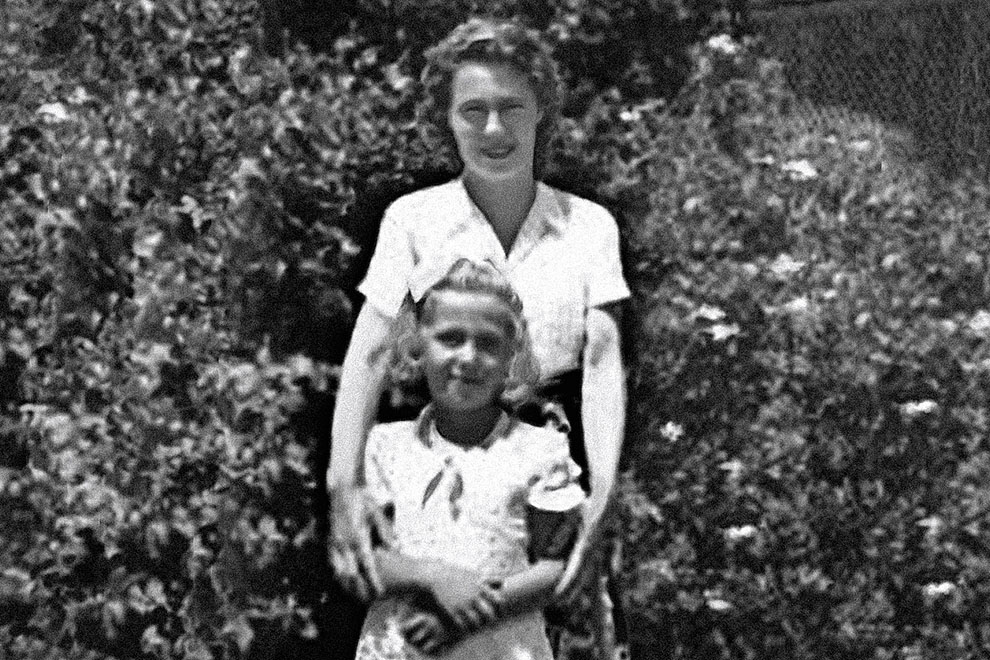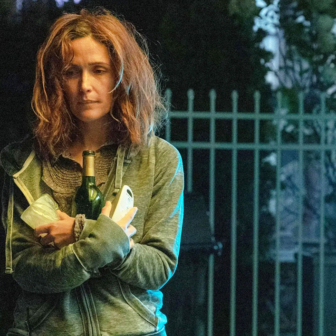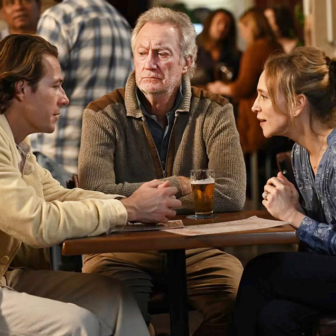In a year fairly drenched in commemoration, Sophia Turkiewicz’s brilliant feature-documentary, Once My Mother, has arrived as a special kind of disturbance: put world history and traumatic personal memory together, and you change the present moment of the audience. Its central character, the director’s redoubtable mother Helen, says at one point that the historians lie; they leave out much that really happened. This film exists to set down in public memory some parts at least of what Helen, a veritable orphan of the storm, lived through in the worst years of Europe’s mid-century. It is driven by Turkiewicz’s own unspoken imperative: this is what she inherits, these are things which should be known, and her own wrestling with her mother’s actions must be dealt with as well.
Helen was born in the 1920s in an impoverished Polish village, to parents who died in her early childhood. She was uncared-for, denied schooling, and grew up as an illiterate servant, pushed and chivvied from one menial corner to another. She became one of a dispossessed Polish population that was ruthlessly trekked and railed to a desolate, snowbound corner of Siberia, and from there by stages through central Asia to Tashkent, across Uzbekistan to the Caspian. The crossing of that sea becomes vividly metaphoric; these refugees will not return. They join the polyglot crowds, refugees moved from eastern Europe into America, Africa, Australia. Helen wanted to reach England; but in Lusaka she had become an unmarried mother, and for that reason England didn’t want her – those were the days... Sophia, retrieving her own story, finds her father and his family in Italy; luckily for her, that meeting is a happy one.
“Harmonic” is a word that occurs as we watch the assemblage of archival film from the near and further pasts of the story, brought together with images from the moments of its making. A symmetry is uncovered: Helen left the child Sophia in a Catholic orphanage in Adelaide for two years while she worked to support their lives. She hadn’t much choice, and she visited on Sundays; but two years is a long time in a child’s life, and for decades Sophia didn’t forgive what she felt as abandonment. One thread in the story is her own process: finding the pieces, making sense of them, forgiving. Past and present are brought consciously into balance: here’s the aged Helen in the old people’s home, joking with her daughter that it’s her turn now to be put in an orphanage; explicitly, they forgive each other, knowing what they’re doing with their histories as they speak.
All that is, as it were, the film’s inner process, parts of the story’s arrival; but the images of its material journey are unforgettable – the blowing snows, the Siberian forests, the long trails of trudging, always expendable humanity heading for god-knew-where. They ate grass; they ate the flesh of dogs and horses; they often ate nothing. Meanwhile there are images of Stalin, Hitler and the Western rulers, playing with the fates of populations. “Harmonic” becomes inadequate; the film is a symphony.
Its genius is that it brings that story home, to this place and to the present. We see Helen, having found home in an Adelaide suburb, tending her garden and blessing the Australia that welcomed her. In her last days, she doesn’t know that it’s no longer that Australia at all; she will die in merciful ignorance of its cruelty. As ever, the audience must complete the film for itself.
A Most Wanted Man has been packing them in around here, and this may be partly because it’s known to be the last outing for a great actor, the much-lamented Philip Seymour Hoffman. It may also be from word-of-mouth, spreading the attractions of a thriller in which all the key references are up to the minute we live in. Much of the film commentariat has written it down as a potboiler, a mere concoction; but they underrate the film’s brilliant speed and precision, its fidelity to its cinematic traditions, and its fine-strung attention to the global confusions of the moment.
The hunted victim in the story, Issa Karpov (Grigoriy Dobrygin), is a refugee; at the outset, he has escaped from a Turkish prison. His story is overladen, over-determined; his teenage Chechen mother was raped, and Karpov’s empowering hatred is for the unknown Russian father. (For those who might be curious on the back-story of Chechnya, vide the well-translated accounts by the martyred Russian journalist, Anna Politkovskaya.) All Karpov wants is to get rid of a load of tainted money inherited from that father, and pass it on for the benefit of others who are hunted and homeless. He comes to the attention of a German civil-rights lawyer, Annabel Richter, played by Rachel McAdams – who, for all her purposeful energy, seems a bit too young and beautiful for the part; by contrast Robin Wright, as the seasoned CIA official who turns up everywhere, intently observing, is better linked into the narrative web. There’s a particularly compelling sequence in which Wright’s Martha exchanges questions with Hoffman’s German anti-terrorist operative, Günther Bachmann, who downs tablets and laces his drink as they speak.
The film was directed by Anton Corbijn, written by Andrew Bovell from the splendid novel of 2008 by John le Carré (who was himself on the production team) and edited with laser clarity by Claire Simpson from Benoît Delhomme’s cinematography. The supporting cast includes Willem Dafoe and Nina Hoss, among others of notable strength; but it belongs to Hoffman. We should allow a sense in which (here, as with Brendan Gleeson in Calvary or David Gulpilil in Charlie’s Country) a central performance can amount to an important share in authorship. Perhaps, in the facile wisdom of hindsight, we can see Hoffman bringing his own burdens to the role. Günther Bachmann, with his unhealthy sagging body, and that casual, near-suicidal carelessness for his own wellbeing, has the persistent sadness of one whose mind is bigger than his job; his piano-playing moment toward the end says it all. He knows what le Carré’s anti-heroes always know – this kind of operation can only end badly, and the story will turn the term “intelligence” into irony. The watchers are always being watched; the audience becomes conscious of its own role. Somewhere along the line, in this post-post-cold war era, we’re implicated.
As I write now, the annual Israeli film festival is opening in Sydney. There is a demonstration outside the cinema, and many honourable cinephiles, some of my friends among them, believe we should boycott the program. I cannot agree with them; I think it should be recognised that very many Israelis, with Jewish people across the whole diaspora, are not simply opposed to the Occupation but are actively involved in communicating against it. Those include some, if not all, of the film-makers whose work can be seen in the festival program; they are no more to be identified with Netanyahu and his cohort than are most Australian film makers with our present government’s policies towards refugees. There is nothing to be gained, and much to be lost, in shutting our eyes and ears to Israeli division and dissent. •





